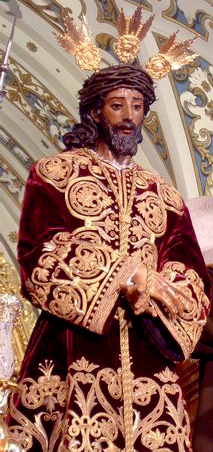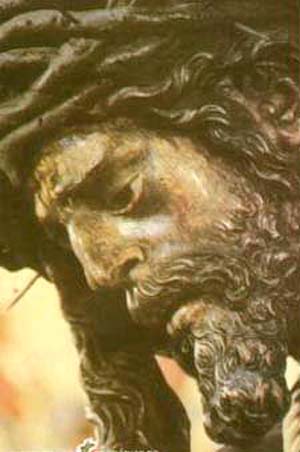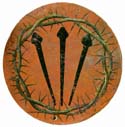 |
Special Devotions
Lent and Holy Week Meditations
The Reproaches of the Passion - I
Prof. Plinio Corrêa de Oliveira
One of the most beautiful ways to follow the Passion of Our Lord Jesus Christ is to meditate on the Improperia, or Reproaches of the Passion. The Improperia are a series of lamentations from the Old Testament about the ingratitude of the Jewish people, which are a prefigure of the Passion of Our Lord. They are twelve reproaches that start with a prophetic lamentation by Micheas (6:3-4).
The Church sings them at the ceremony of the adoration of the Holy Cross on Good Friday after the death and burial of Our Lord. Following the consummation of the Passion, the gratitude of the Church turns to the Cross, that vile instrument of torture which became the sublime instrument of our Redemption. In my opinion, the Improperia epitomize the poignant contrast between the innocence of Our Lord and the ingratitude and guilt of the Jewish people.

In the Improperia, Our Lord reproaches the Jews for their ingratitude | |
They present Our Lord questioning His people, reminding them of the benefits God gave them, and asking them why they inflicted such torments on Him. There are twelve Reproaches that are sung in the same plain-song melody.
When we hear the Reproaches, we should not just consider them as past historical facts from the Old Testament evoked by the liturgy of the Church after the Passion, but we should apply His lamentations to our days and to ourselves. Our piety should imagine Our Lord in each step of His Passion – Agony in the Garden of Olives, Scourging, Crowning with Thorns, Way of the Cross, Crucifixion, and Death – as if He were present before us suffering only for the sins of each one of us. We should imagine Him asking each one of us those poignant questions He addresses to His people.
It is common knowledge that Divine Providence gives special graces for each commemoration of the Church. During Holy Week, there are, therefore, torrents of graces – necessary graces, abundant graces, and super-abundant graces – that Heaven sends us so that we might unite ourselves to Our Lord and Our Lady. We should open our souls for those graces especially in the steps of the Passion with which we have more affinity.
The normal fruit of these meditations should be a sentiment of remorse for the evil we have done. Not a disturbed, agitated remorse that leads to despair, the remorse of Judas, but the tranquil, peaceful, and bitter remorse full of confidence that invites us to ask Our Lady’s help and change our lives, the remorse of St. Peter.
It is a time to remember our past life, the graces we received that cost so much suffering for Our Lord, and the bad or insufficient responses we made to those graces. Should we not repent and repair for our offenses? Should we not make reparation for the evil we have done? Should we not shift our lives in another direction in order to unite ourselves more to Our Lord? We should ask these graces by the merits of the wounds He received and the tears Our Lady shed. We should be confident that we can receive those graces because even such a great sinner like the good thief St. Dismas was forgiven and won Paradise.
The first Reproach is this:
My people, what have I done to you? How have I offended you? Answer me!
For I led you out of Egypt: you led your Savior to the Cross.

"My people, what have I done to you?
How have I offended you? Answer me" | |
Our Lord is perfect and never did evil to anyone. He asks these questions to emphasize the ingratitude of those responsible for the crime of the Crucifixion. He invites them, “Answer me!” He knows that the guilty ones do not have a response, but He is inviting them to repentance.
In fact, the Jewish people were liberated by Our Lord from the land of Egypt. They were slaves there for centuries and God delivered them and led them to the Promised Land. So Our Lord asks: “Are you offended because I delivered you from your captivity? O, my sons, is this a reason for your hatred for Me?”
The passage of the Hebrew People from their captivity in Egypt to the Promised Land is a symbol of the passage of all of us born in original sin to the state of grace by means of the Redemption of Our Lord Jesus Christ. It is also a symbol of the passage of our souls from the state of mortal sin to that of grace. How many times have our souls been dead because of our sins, and how many times has Our Lord restored us to the life of grace?
So, the question He poses to the Jews is also valid for us. He is asking us: “My people, what have I done to you? How have I offended you? For I led you out of the death of sin, and you led your Savior to the Cross. My son, see the state of your soul.”
The second reproach is this:
For forty years I led you safely through the desert;
I fed you with manna from heaven, and brought you to an excellent land;
And you led your Savior to the Cross.
Here is another figure of the liberation of Egypt presented in a different way. The manna is a symbol of the Holy Eucharist. The reproach for us would be this: “Because of My love for mankind, I assume the form of the Holy Species to live among you and enter your hearts, but you crucify your Savior.”
The splendid land is the Catholic Church. She is the perfect land, the homeland of our souls. To be Catholic is the highest honor and the greatest happiness God could give us. Is this the reason why we make Him suffer?
It is both a tender recrimination and an implacably logical question for which we have no answer. Any possibility of a justification vanishes in thin air. Our only response is to fall on our knees, repent, weep, and change our lives. We can only turn to Our Lady and ask her help and make our act of contrition.
It is beautiful to hear these strophes of the Reproaches being sung by a good choir because the questions of Our Lord resound with a special tone of sweetness and supplication that touch the soul. They demonstrate in a magnificent way the blend of strength and tenderness present in the infinite sanctity of the soul of Our Lord Jesus Christ.

This meditation by Prof. Plinio Corrêa de Oliveira was summarized
and adapted based on notes taken by Atila S. Guimarães
Posted April 3, 2006


Related Topics of Interest
 The Reproaches of the Passion - II The Reproaches of the Passion - II
 The Reproaches of the Passion - III The Reproaches of the Passion - III
 The Meaning of the Three Falls of Our Lord The Meaning of the Three Falls of Our Lord
 The Love of the Cross in Today’s Life The Love of the Cross in Today’s Life
 How Should We Follow the Passion of the Catholic Church? How Should We Follow the Passion of the Catholic Church?
 The Seven Last Words on the Cross The Seven Last Words on the Cross
 The Symbol of the Chalice in the Garden of Olives The Symbol of the Chalice in the Garden of Olives
 The Grace of Contrition and the Reign of Mary The Grace of Contrition and the Reign of Mary
 The Fidelity of the Remnant throughout History The Fidelity of the Remnant throughout History
 How a Catholic Should Act in Face of Bad Popes How a Catholic Should Act in Face of Bad Popes

Related Works of Interest
|
|
Special Devotions | Religious | Home | Books | CDs | Search | Contact Us | Donate

© 2002- Tradition in Action, Inc. All Rights Reserved
|
 |
|